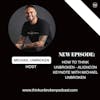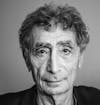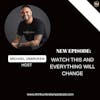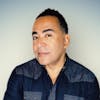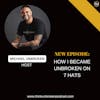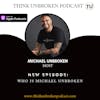The Road to Self-Love and Happiness after Childhood Trauma
Life can present immense challenges that leave us feeling stuck or limited. However, with the right mindset shifts and personal development strategies, it's possible to break free and pave new paths of...See show notes at: https://www.thinkunbrokenpodcast.com/the-road-to-self-love-and-happiness-after-childhood-trauma/#show-notes
Life can present immense challenges that leave us feeling stuck or limited. However, with the right mindset shifts and personal development strategies, it's possible to break free and pave new paths of possibility.
In this episode, we dive into the journeys of those who faced trauma, adversity, self-doubt and other struggles, yet emerged stronger, finding purpose and fulfillment.
Steven Cohen shares how reframing his relationship with past hardship fueled his motivation and success. Derik Fay credits his "no option but to keep going" mentality to surmounting obstacles. We gain insight into handling trauma and building self-love from psychotherapist Lori Gottlieb. Lisa Dahl reveals her journey from disordered eating to intuitive health.
Join us as we explore the mental shifts, courageous actions and community support needed to overcome limitations. Discover how loving ourselves and progressing toward purpose leads to happiness, no matter what hardships we face. Get inspired by those who flipped their narratives and boldly created the lives they imagined.
************* LINKS & RESOURCES *************
Learn how to heal and overcome childhood trauma, narcissistic abuse, ptsd, cptsd, higher ACE scores, anxiety, depression, and mental health issues and illness. Learn tools that therapists, trauma coaches, mindset leaders, neuroscientists, and researchers use to help people heal and recover from mental health problems. Discover real and practical advice and guidance for how to understand and overcome childhood trauma, abuse, and narc abuse mental trauma. Heal your body and mind, stop limiting beliefs, end self-sabotage, and become the HERO of your own story.
Join our FREE COMMUNITY as a member of the Unbroken Nation: https://www.thinkunbrokenacademy.com/share/AEGok414shubQSzq?utm_source=manual
Download the first three chapters of the Award-Winning Book Think Unbroken: Understanding and Overcoming Childhood Trauma: https://book.thinkunbroken.com/
Join the Think Unbroken Trauma Transformation Course: https://coaching.thinkunbroken.com/
@Michael Unbroken: https://www.instagram.com/michaelunbroken/
Follow us on TikTok: https://www.tiktok.com/@michaelunbroken
Learn more at https://www.thinkunbrokenpodcast.com
Support this podcast at — https://redcircle.com/think-unbroken-with-michael-unbroken-childhood-trauma-cptsd-and/exclusive-content
Advertising Inquiries: https://redcircle.com/brands
Privacy & Opt-Out: https://redcircle.com/privacy
Support the Podcast: Become a listed sponsor!
Follow me on Instagram @MichaelUnbroken
Learn more about coaching at https://coaching.thinkunbroken.com
Get your FREE copy of my #1 Best-Selling Book Think Unbroken: https://book.thinkunbroken.com/
How to Get Unstuck: Proven Strategies for Breaking Free from Limitations | with Steven Cohen
Michael: What is it like for you when you're like, I have to do this anyway, despite the fear, despite the limitations, despite the thing that your dad did, like how do you actually pull yourself through that moment of stuckness?
Steven: I think it comes down to shifting the relationship to that experience. And I'm grateful because I didn't have that breakthrough moment of realizing, man, the reason that I am the person I am today. The reason that I have the desire that I have, the inspiration that I've been able to live the life and create all the memories and experiences and all the six success that I've been able to create in these last 6, 7, 8 years is because of my dad.
So, I believe that if you're blaming, whether it's your dad in this scenario or anyone, your childhood, your environment, if you're blaming them for all the shit that they created in your life, you also have to blame them for all the good that you've created in your life. You can't just blame someone for all the negative, because in any scenario, there's always duality to a situation. There's always positive and there's always negative, it's on you. It's up to the individual, what you feed and what you give power to. Sure. There were a lot of challenges that I occurred growing up that if I didn't become aware of, I think awareness is key in anything you do because as you know, Michael, you train about this all the time whatever happens when you're younger typically gets stuck in your unconscious mind and runs rapid in your adult life if it's not addressed. So, I believe the first thing is you need to bring awareness to why am I am? Why am I doing the things I am today? Why am I the person I am today? Why am I timid in situations? Why am I scared to be successful? Why do I continue to attract the same partner, the same business opportunity, the same negative scenario in my life? And when you can trace that back to a certain moment, for me it was my dad in multiple situations, you put awareness on that situation and then you can look at it from an objective standpoint because when you're in the emotion, when you're in the muck, it's very hard to have that objective higher perspective to be able to make moves and shift the relationship. So put awareness on it, delete the power, reduce the power that it has above you, and then shift the relationship that you have with it. For me, it took personal development, it took increasing my identity, it took hindsight in order to realize, man, that situation again, as Tony Robbins says quote unquote, “a really bad time in my life was actually a really good time in my life” because as I looked back, I was able to connect the dots looking backwards, and I realized, man, the reason I am the person I am today is because of that scenario and that decision led me to this decision, led me to this decision, and that eventually led me to the person I am today. So, to answer your question, I believe it comes down to putting awareness on it, shifting the relationship that you have with that, and not just blaming that situation, experience or individual for the bad. You also have to blame them from the good and choose to pull from that, not the negative.
Michael: Yeah. And that's the hardest thing that you do, especially when it comes to our parents, right? Because in our heads, and I think part of it is the world we live in today between not just media, but the propaganda of they're your parents, that's your sister, that's your dad no matter what love them. Dude. I just got into; it went viral where it got shared like a thousand times. I think that's viral, whatever. And I had posted, and I had written about setting this boundary with my mother and removing her from my life when I was 18. I think I've shared this story with you, obviously, Unbroken Nation, you guys have heard this a million times, but it was incredible to watch the comment section of this post where people were so, pitch fork and torch chasing me down in the back alleys like I'm Frankenstein, talking about, that's your mother. How dare you? You should be a grateful son, this and that. And my thought process in that being like, no, no. I shifted my reality with an experience that was not for the betterment of my future and making a decision and saying, I'm actually gonna remove my mother from my life connecting dots, right? If I go back, mother cuts my finger off. Drug addict, alcoholic makes us be homeless, chooses drugs and alcohol over her own children, blah, blah, blah, blah, blah, blah, right? 18 years old attacks me. I go, no more. I'm done. Fast forward 20 years later, here I am sitting with you, impossible for us to have this conversation without connecting those dots. And so, and I agree with you entirely, and this is one of the hardest things that you will ever wrap your head around is how can I assess and acknowledge that the reason that I'm successful is the same reason for a long period that I wasn't? And that's scary. And there's also some responsibility for self-know thyself, I think is the cornerstone of this whole game, all of it. Everything. It's like, can you look at the mirror, acknowledge who you are, and be like, this is who I am because of those experiences and I don't think it's easy to just have these narrative shifts, even with coaches and mentors and you and I share many of the similar coaches in our life and in our experiences, and even still, even at the work that I do, even 13 years into this game, I'm still creating shifts. What I'm curious about now for you is like, as you're looking at your life through a different scope, heading into a, a milestone birthday in your life and looking at some of the success you've been able to create. What are the scenarios in the situations that you're looking at and assessing on a daily basis through the scope of that's who I used to be, this is who I want to be, but this is where I am?
Steven: It's a really good question because I feel like in life you have to continue to evolve. I believe that happiness follows progression. Doesn't matter what you're doing in life, as long as you're progressing in something that you believe in, you are by definition happy. So, you also have to realize that in order to create a new you, In a sense, you have to give up the old you in order to create a new story for your life, you have to let go of the story that you continue to tell yourself on why you can't be X, Y, and Z. So, I use my past, I use my environment that I grew up in as something to continue to fuel me. So, a couple different pieces on this. A lot of people ask me, Hey Steven, how are you so motivated? How do you stay so inspired? How do you stay so focused? Because in my business it's very easy to get complacent. It's very easy to drift. It's very easy to lose purpose and lose fact. A lot of people ask me, Hey Steven, you bought your parents a house. Hey, you did this, you retired. Then, how do you still stay successful or how do you still stay, you know, motivated for me. I have to continue to evolve my why and the reason why I do what I do. If you accomplish a big why for you, Michael, a successful coach, a successful podcaster, I'm sure this was once a dream of yours that you once accomplished. The challenge with most people is once you accomplish a big dream, a big goal, a big why, a lot of people, they fall off their horse because they did the thing that they once imagined that they can never do. So, you have to continue to evolve your why. But for me, I actually still leverage my past and my fear to keep me inspired and motivated because I'm trying to create so much distance from the person that I used to be and today, and I know that if I stop focusing on the things that keep me fired up, if I stop focusing on my progression, my goals becoming a better person. And I'm not talking monetary goals. I'm talking how to be a better son, how to be a better boyfriend, how to be a better communicator, how to be a better contributor to society. If I stop focusing on that, I believe that I am starting to r regress back to the person that I used to be. So, one, I want to create as much distance from my old identity, my old life, the self-conscious, low self-esteem, cared about what everyone thought about him, broken family. I want to create as much distance from that individual as possible and I do that by continuing to focus on the thing that I know is going to progress me into the new version of myself.
The Pursuit of Happiness: Derik Fay's Remarkable Journey
Michael: This is where I'm leading, like where does it, like how are you able to do this? Cuz people ask me all the time and my answer's very simple. I'm like, I just refuse to not do it. I don't know what else to do other than to just keep going forward, like where does that aspect of like, I'm actually gonna do it ‘cause a lot of people have the conversation in their head, 2% of people take the action.
Derik: Yeah. I guess like you, I don't know how not to, because as a kid you, I didn't have the option. I didn't have the option to say, I don't want to experience this, I don't want this to happen. There was no option. And so, like you said, on days when you don't want to do shit or days when you don't want to, a – the place we came from really turns down the volume and what other people find really stressful. And so for me, for whatever, I really operate at my best in turmoil. When people are freaking out, when shit's going wrong, I'm locked in, I'm at my best, that may not be the healthiest thing it has served me very well, but because I would've quoted to equate it to almost like PTSD, which I'm sure I had.
I remember like symptoms and telling like doctors and they didn't know what the hell it was, they thought something was wrong with me. You know, sounds that were soft, being really loud and I'm in class and you become overwhelmed. And no one knew what it was cuz no one knew what was going on. But I think that's what it comes from, I never had an option as a child so as an adult you just do it. And there are days today, even, not today, but there are days in my life still where, like you said, sometimes you get overwhelmed, sometimes you get stressed out. But I've still got that in me that okay, I don't have that option, you just kind of keep pushing through and that's not the greatest explanation ‘cause people be like, okay, well how do I apply that to my life? I don't necessarily have that answer but like you, that's really the best answer I can give.
Michael: Yeah. I don't know how to apply it to my life other than applying it to my life. You know, and it's like, I'll sit and I think one of the things that's been really beneficial for me is like the journal. I mean, it's my best friend and I just, I sit and I write all the time. I'm a writer first. Before the podcast, before the coaching, I was writing books or I was writing blogs and I was writing, you know, to myself. And even as a kid, it was like my mechanism. And it's like, I just kind of like, look at a potential of a future, right? I'm big on visualization. And I just look at it, I go, okay, I'll give you a great example of this. So, I've shared this story before, but people who haven't heard this will understand. Three years ago, Grant Cardone invested into Think Unbroken. Grant Cardone does not give people money. And what happened, Derik, is I had to go in front of 10,000 people and pitch in a Shark Tank style environment competing against 10 other companies. I f*cking crushed every single one of 'em, of course, because I had seen it in my head, a hundred thousand time that moment. But people see that moment and it's almost like they're terrified of it, they're terrified of the potential. Here's how I think about life.
Life is all about like closing the gap in your identity. Here's who you are today. Here's the person that you want to be. And everything in between is the mindset shifts, the actions, the showing up, the doing it when you're scared, the being, having a good community, working hard, showing up the whole nine. And it's like, how do you make people do this side? Right? Like, this is what I'm always thinking about. And for people like you and I think it almost becomes pre intellectually natural because I don't have another fucking option.
Derik: That's what it is. Yeah. And I struggle with the same thing cuz I think like you, I know that if I can have what I have and I can do what I've done I'm not just saying this, I believe that anybody can, but it is frustrating because you can't, you wouldn't want to give them what happened to us. And it's very difficult to verbalize how to do the things that we do because, well, we just do them. But that's been a part of this new journey for me doing speaking engagement stuff is trying to verbalize the things that I've just been doing my entire life that have gotten me here. It is very frustating, especially with friends and family when you're trying to get them past that their hurdle, their hump, their, whatever it is they think is in their way, it's frustrating because as you said, it is and people, I almost feel silly when I do it cause people I know, people are like, okay, sure, it really is as easy as. I'm a huge visualization. Same thing. Anytime I'm gonna get on stage, anything, I've got something up. I've already done, like you said, a hundred times, I've already seen the people clapping like my subconscious already has done it, knows the outcome, and then I'm almost on autopilot because it's almost like watching a movie. And so, but you try to explain that to other people.
Michael: Real time I'm having a thought that I think you're connecting dots that I've never connected about why visualization works for me. When I was a child, I watched Rocky probably a hundred times, it's my favorite movies all the time. It's tied with the Matrix, right? But I would watch Rocky all the time, all cause it always came on like regular TV. And like you'd have to sit through the commercials and all that, but I always just envisioned myself like being rocky. Do you think that like, that childlike imagination of seeing shows like the lifestyle of the rich and famous, et cetera, like made you more imaginative?
Derik: A hundred percent. TV raised me. I mean, TV raised me for sure, Rocky, you know, Rocky's an analogy for life, right? Of course anyone that comes from nothing, we all are like, I'm that guy. I'm getting the shit beat outta me, but I'm gonna keep getting up and then eventually he beats Apollo. I mean, it's what our life is, it was right. But yes, I believe a hundred percent that the TV was a massive influence and created, like you said, a massive imagination in me in so even as my grandmother on the other side until she passed a couple years ago, she always tell the story that when I came over, I would pronounce to everyone on that side of the family. And this is like seven, eight years old. I'm gonna be a multimillionaire, I'm gonna be a multimillionaire. I'm gonna move to Florida, which I did do and do all these things. And of course, people and my grandmother always found it fascinating. And then, of course it ended up happening the day so I turned 22, I got and left, went to Florida, which was 20 years ago, 21 years ago. People are like, you, you going to retire? Like, no one moves to Florida at 22 years old. What the hell are you doing? But it was all because I swear to God, I had that image in my head. And if I think back to like, lifestyles, origin, famous, it wasn't Florida, it was probably la but I saw palm trees and I'm like, that's Florida, that's where rich people go, that's what I'm doing. And honestly, it's funny, you're so funny you say that ‘cause tomorrow the big part of the opening part of my speech is encouraging people to think like a kid again. Like we as kids, anything was possible. We always asked why. We always asked what if. We always, we wanted to do all these massive things and then this horrible thing happens. Everyone tells you you're being silly, everyone tells you it's not gonna happen. Conform, stay under the radar. Shrink your goals, all of this shit that never happened to me. I'm still as inquisitive and creative and actually delusional as I was when I was eight years old and that's a goddamn good trait because otherwise, you're part of the herd, man.
Michael: I agree. Well, but it's safe, man. You look at the Maslow's Hierarchy of needs. Look at Tony Robbins six needs for human life like they're basically the same thing, right? But you look at it and like comfort equals safety.
Derik: Ultimately, and with most people it ends up in unhappiness.
Navigating Trauma and Mental Health with Lori Gottlieb, a Psychotherapist's Perspective
Michael: I'm wondering for folks who are like, I wanna share an intimate detail of my life with my partner, maybe we've been together five years or 15 years and it's something I've never told them and I know that I need to tell them ‘cuz it keeps me awake at night and I can't sleep and it's driving me crazy, I'm pull my fucking hair out. How do they do that?
Lori: I think that's such a paradox that people are worried that they'll come across as weak by sharing something vulnerable, and it takes so much strength and courage and bravery to do that. So, the people who are actually able to share those things are very, very strong. And I think that we need to make sure that that's the message that's getting out there. I mean, think about how much strength it takes to show up, to be present, to be authentic, that's so hard. It's so much easier. You know, when we talk about weak, and I don't really like to categorize people as sort of strong or weak, I think it's about fear. And I think that people who are more afraid are people who are going to keep things to themselves, are going to kind of live a very limited constricted life because they're so afraid of living fully because of the inherent risk of living fully. If you want to live fully, you are going to risk getting hurt. If you're going to love fully, you are going to risk getting hurt. But the thing about love, and I'm gonna talk about all kinds of love, you know, platonic love, romantic love is that sure love can hurt us, but love can also heal us. And if you don't show up, you'll never see how love can heal you.
Michael: Hmm. That's powerful. How does love heal you?
Lori: I think that love shows us that we can connect with another human being and just by being ourselves and that we are enough, that we are inherently lovable, that we are flawed, that we have moments of, we have heroic moments, we have our, not our finest moments, all of it, the whole spectrum of who we are, of our whole humanity, and we are still inherently lovable, that is so healing, that makes you walk through the world so differently than worrying about, am I lovable? Am I worthy? You know, all of those things, just knowing that you are lovable and people say, oh, you have to love yourself first. And I always sort of have trouble with that because what I see is that it's both that you have to show up as somebody who believes that you're lovable, but you also need to see it in practice in the world. Both of those things I think need to happen.
Michael: Yeah, there's definitely a parallel tract, right? And as you're going through, it's interesting me ‘cuz it's like a mirror and I've been thinking about this a lot lately. Like you bring into the world what you are and if you are hate and despair, you will find hate and despair. If you are love and peace, you'll find love and peace. And I'm with you, I do think that it is a parallel track, but I think that at the beginning of it, and this is also I'll just speak from first person, as I discovered at 27 years old, that I had never loved myself. We're talking 12 years ago now because of the implications of all the abuse that I went through, because of all the experiences of my life. The singular hardest thing that I had to do was recognize that you have to build love in yourself, and I think that a lot of people find that feels insurmountable, that to your point, they feel unworthy, they feel unlovable, they feel like they don't matter in the world. What are some things that people can start doing? What are things even that for yourself in your personal life that you've done to love yourself and that maybe other people can take into consideration?
Lori: I keep thinking about you as the 27-year-old because you know, we have this saying, tell me how you were loved or show me how you loved now, and I can tell you how you were loved as a child.
Michael: Absolutely.
Lori: And I think we see that we know not just as a therapist, but you can see that with your partners, right? Like when you meet someone and you say, oh wow, they really interpreted that comment that way. Oh, this is historical, you know, we always say if it's hysterical, it's historical, meaning that if you're having a reaction that feels bigger than what's happening right now in the present in the room, there are probably some ghosts in the room, there are probably some people in the room from your past that are sitting in the room with you that made you go from zero to 60 really fast. And so, it's really important when we talk about loving ourselves, that we understand the way that we were loved as children is not necessarily an accurate view of how lovable we are, that the way we were loved as children is more about the person who loved us that way and couldn't love us in a certain way. It was more about them than it was about us. So, we believe the story, we all have stories that, that carry us through our lives. And what I do as a therapist is I feel like, and you know, I have a writing background too, so I feel like what I do is I work as an editor and I help people to edit the faulty narratives that they're carrying around about themselves. I'm not lovable. I can't trust anyone. Nothing will ever work out for me, whatever those stories are. Or sometimes people have these stories that they use to cope when they were younger like, I'm better than everyone else which is also not true. So that's not self-love, that's narcissism. So where did we get these stories? And we have to understand that if you had a really critical parent, it wasn't because something was wrong with you, it was because something was wrong with them and something was wrong with their parent. This is the generational trauma that we talk about, and the person who finally comes to therapy and says, I don't want to not only treat myself this way, but I don't wanna pass this down, even if you don't have your own children, like I don't wanna pass this down to, you know, whoever I'm in contact with. This is not okay. Something is wrong with this story. Not something is wrong with me. Something is wrong with the story that I was told. I was told a faulty narrative and I believed it because I was a child and I didn't know any better. But now I can really look at this critically and say, wait, how true is this? And am I doing something to perpetuate this story? Am I choosing people who are going to like, keep that story going? Right? Do I choose critical people, angry people, damaged people and damaged I don't mean that in a pejorative way. I mean, people who haven't done the work to kind of see what story are they carrying around and what are they inflicting on other people. So, I think that the first thing we can do is to examine our stories. You know, where did I get this message that I'm not lovable, that something's wrong with me, that I'm defective, that I'm not normal, whatever that means. Every single one of us is quote unquote normal, we're just human. But what are these maladaptive ways of being in relationship that kind of perpetuate the story where we choose people who are going to hurt us in exactly the same way, that we were hurt when we were younger. I always say that, you know that that's called repetition compulsion. But I always say that we do that where we say I'm gonna find someone who's going to treat me differently from the person who hurt me when I was younger. And then we go out in the world and we find these people who are like really good partners first, potentially. But we go on a first date or a second date, we're like, yeah, no chemistry because we're not used to being treated well. So, our unconscious is, yeah, I don't recognize that, that's not familiar. So, our unconscious is looking for quote unquote home. Home is the familiar of what we did when what we had when we were younger. And so instead, then we go and we go out on this date, or we meet someone somewhere, we say, oh, that person, Hey, you look familiar. Come closer. And what's familiar about them is that unconscious. Oh, they're gonna hurt me, but we don't know that in that moment. So, then we get into relationship with them and we're like, wow, I didn't realize that they were like addicted to this thing. Right? Or I didn't realize that they have anger issues, I didn't realize that they can be really kind of passive, aggressively insulting, or they're very jealous of my success. Right. They try to shut down my joy. Oh, I that feels really familiar. And then like, you know, all men are like that, all women are like that, you know, all women are crazy, all men are controlling. And it's like, no, no, no, no, no you're choosing people who are like that person who raised you with that model. So, we have to do the work, that's where the work comes in therapy is, you know, and then maybe you should talk to someone in my book, there's a woman just like that, and she has this idea that the problem is out there the problem is with other people and it's not about who she's choosing. And we come to realize, hey, it is about who you're choosing and wow, when you start really repairing your relationship with yourself and setting boundaries with your parents and understanding more about what was them and what was you. Now, when you go on that date with someone who's healthy, you're like, oh, I'm interested in that person.
Lisa Dahl - Heal Your Body And Mind With Food | Trauma Healing Podcast
Michael: What was health at every size? What was the lead up to that? Were you cognizant that something was wrong? And if so, what are those telltale signs and what became the indicators for you?
Lisa: So, you know, and I have been on both sides of that scale like even though I could diet and restrict and binge, there was absolutely that typical rollercoaster of going on that other side. And what really was the precipice is that I just always having shifted careers later in life was part of me is always needing to learn, always knowing that there's something else out there. And because of that, somebody had shared this book and I devoured it, like all of a sudden, the diet rules, ‘cuz we are taught that the diet knows best. So, we have this diet that millions of people are following and then we are told over and over and over again. So, when you hear things over and over again, we believe them to be true. So often what happens is that people will say to me, well, I'm so out of control when I'm off of my diet. I don't know what to do. I feel awful because they're going from restriction to binge so they don't understand that it may not be about that particular food, it may be about the quantity of food, it might be how they're using that food, what is their stress, what is their emotions? Because all of these things go into it. So, when we are talking about how does food make you feel? There's a concept, there's a principle in the practice of intuitive eating called giving yourself permission to eat food. When we don't have permission to eat food, what happens is that we go into that last supper – type of mentality. And that last supper mentality is I broke my diet. I'm going to eat all of these things, which could be an entire gallon of ice cream, it could be an entire bag of chocolate chip cookies, and I'm gonna stop at 11:59 and 59 seconds because tomorrow morning when I wake up, I'm gonna go on my diet, or its New Year's Day, or it's Monday, whatever it is. And then we think that these foods make us feel bad. When you learn to give yourself permission to have food, you go through a process called habituation you know, when you're not starving, when you're not stuffed, when you are present. Let's say that it's ice cream. Nobody else is around, this is between you and your food. You're not hiding in the pantry. You're gonna take out your ice cream, you're gonna put it in your bawl, you're gonna sit. You're going to be present with that food, and you're gonna start to notice how do you feel while you're going through this eating experience? And you can eat as much as you want. So chance you're gonna eat the full thing for the first 3, 4, 5 days, maybe even the first week. When you know that you can have it tomorrow all of a sudden you don't have to finish it. You don't have to be part of that clean plate club. It changes how you respond and how you respect your food and your body, so that if I have a handful of M&M’s, big deal like, it doesn't matter if I eat the two-pound bag, I'm going to feel awful. Noticing that process, how do you feel with your hunger? What do you notice as you shift? When do you hit full? When do you fit over full? When you go to overflow asking those questions, what am I feeling? What do I need? Is this food still serving me? Learning to have that pause, which you have learned to do so well, and sometimes you get it right and sometimes you don't with the practice of intuitive eating, you cannot fail it. It's not like a diet where you are on it or off of it, every eating experience is an opportunity to learn and to see what you can discover about yourself. And some, we all make mistakes. There is no perfection in this world and certainly not with our relationship to food and body.
Michael: You know, I'm wondering like, what was the mindset shift for you? What was actually happening in real time in your life personally as you were starting to step into this new version of Lisa?
Lisa: It was really scary. It's exciting and freeing and really scary, and I'm very fortunate that my partner, who I've now been with for 11 years versus my ex-husband, who is very body conscious and we would have lots of conversations or commentary about me not eating always, you know, torturing a waitress, having a very challenging relationship on how much food I would eat or not eat, and always creating special meals. And even to the fact when I met his parents, they were concerned that I had an eating disorder, and I kind of like blew it off, like, how could that be, you know, I eat all these healthy, nutritious foods. And I was very fortunate that I had somebody and including my parents, like this was all in my head, I wasn't getting the judgment, but I was getting the positive reinforcement, which keeps you stuck in a disordered eating when somebody tells you, oh, you're so thin, you look so great, you know, all BS that has no value, but it makes you feel, as part of diet culture, you feel like you have thin privilege and all of a sudden you feel better than other people and I had to really take notice of, this is not true. This isn't like, how could I be thinking that I'm better than somebody because I have thin privilege? And all of those thoughts started to really come undone and I started to, you know, it was scary to start to eat again and to start to eat in front of other people. It's one thing when you are dieting and you're known for the person who can restrict and deprive, doesn't mean that I didn't go into the pantry and still eat, you know, I was always on the borderline of how much could I eat? Where you wouldn't notice the difference, but I would make sure that I was checking and balancing on that scale you know, if it went up an ounce, I made sure that I shut my mouth that day. So, I was very fortunate to have the support of my partner who always encouraged me to eat and to give me value that I was far more worthwhile than what my body looked like. And part of my challenge growing up is that I have a brother who is extraordinarily intellectual, competitive. And he is a world-class doctor and it all got wound up in, if I couldn't be this, if I couldn't have that same level of intellectual abilities, then at least I could do this really well. And it all started to unravel. And my partner is an MIT Ph.D guy, I mean, he's brilliant and to be seen as somebody who has a brain and a body and that it is a full person package and is not about what I look like or the size of my thoughts and all of those things that I thought were so important started to unravel.
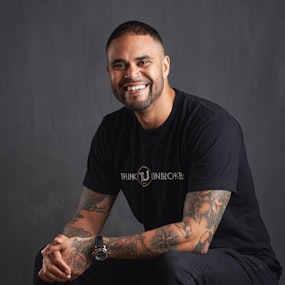
Michael Unbroken
Coach
Michael is an entrepreneur, best-selling author, speaker, coach, and advocate for adult survivors of childhood trauma.
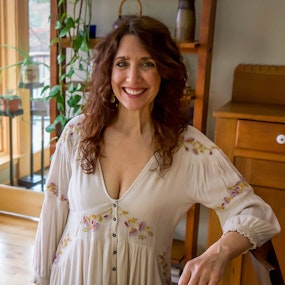
Lisa Dahl
Intuitive Eating and Body Image Health Coach
Lisa offers her signature program, “Body Peace & Food Freedom,” to support women on their journey to break free from dieting and diet culture. Through a series of interactive group and individual coaching sessions, participants will engage in reflective practices that create healthy, sustainable relationships with food and their bodies. Lisa’s hallmark emphasis on mindfulness and self-compassion help women find a successful pathway to whole-body wellness.
Lisa has certifications in Intuitive Eating, Mindful Eating, health and wellness coaching, and personal training. She is a skilled group facilitator with credentials from The Body Positive and Gratefulness.org. Lisa’s coaching philosophy is to ditch the diet and focus on Progress, not Perfection. Learn more about Lisa at www.lisadahlwellness.com.
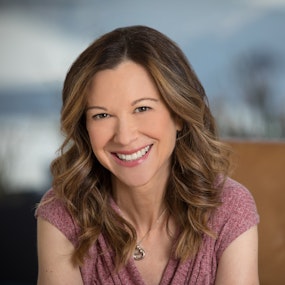
Lori Gottlieb, MFT
Psychotherapist
Lori Gottlieb is a psychotherapist and New York Times bestselling author of Maybe You Should Talk to Someone, which has sold over one million copies and is currently being adapted as a television series. In addition to her clinical practice, she is co-host of the popular “Dear Therapists” podcast produced by Katie Couric and writes The Atlantic’s “Dear Therapist” advice column. She is a sought-after expert in media such as The Today Show, Good Morning America, CBS This Morning, CNN, and NPR’s “Fresh Air” and her 2019 TED Talk was one of the Top 10 Most Watched of the Year. She is the creator of the Maybe You Should Talk To Someone Workbook: A Toolkit for Editing Your Story and Changing Your Life and the Maybe You Should Talk To Someone Journal: 52 Weekly Sessions to Transform Your Life. Learn more at LoriGottlieb.com or by following her on Instagram @lorigottlieb_author and Twitter @LoriGottlieb1.
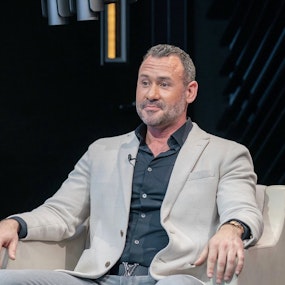
Derik Fay
CEO/ Entrepreneur/ Speaker / Philanthropist
Derik Fay is a business magnate, entrepreneur, investor and philanthropist. He is the founder of 3F Management, a venture capital, operational management, and acquisition firm. He has also created countless of his own highly successful publicly traded and private brands. Fay also invests in countless promising brands across all sectors.
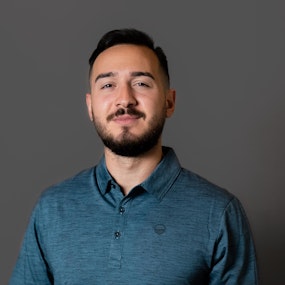
Welcome to The Think Unbroken Podcast!
Here are some of my favorite recent guests!



























